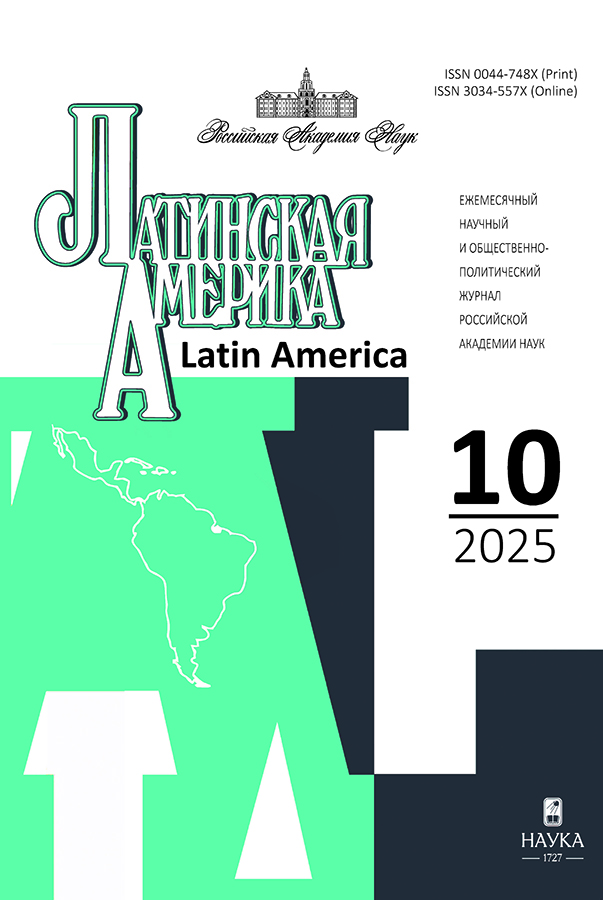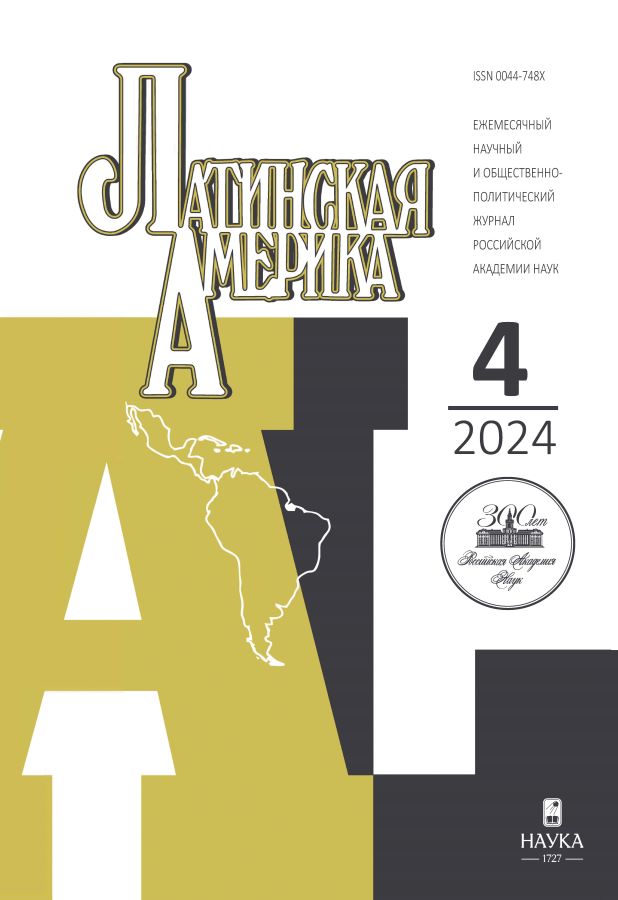State policy and the level of food security in Brazil. From successful eradication of hunger to a food crisis
- Authors: Potapova A.A.1
-
Affiliations:
- RANEPA
- Issue: No 4 (2024)
- Pages: 57-73
- Section: Social problems
- URL: https://rjmseer.com/0044-748X/article/view/667943
- DOI: https://doi.org/10.31857/S0044748X24040047
- ID: 667943
Cite item
Abstract
The purpose of the article was to assess the state of food security of the Brazilian population in the 21st century, reflecting the effectiveness of public policy in this area. Since the early 2000s, this problem has been a priority for the Brazilian authorities, who managed to eradicate hunger by 2014. After the political changes and the departure from power of the Workers' Party (Partido dos Trabalhadores, PT), the agri-food policy was gradually weakened, and the budget of the national food and nutrition system was restructured and reduced. Combined with the effects of the pandemic and the economic crisis, the new deal has demonstrated its ineffectiveness, which has led to an increase in the number of citizens who are food insecure, including the hungry. Regional, gender and racial inequalities in access to food are increasing in the country, and the most vulnerable groups are families with children, low—income and living in rural areas.
Keywords
About the authors
Alexandra A. Potapova
RANEPA
Email: potapova-aa@ranepa.ru
ORCID iD: 0000-0001-6071-9787
Candidate of geographic sciences, researcher, Center of Agro-food policy Vernadsky pr-t., 84, 119571 Moscow, Russian Federation
References
- FAO, IFAD, PAHO, UNICEF and WFP. Regional Overview of Food Security and Nutrition – Latin America and the Caribbean 2022: towards improving affordability of healthy diets. Santiago, 2023, 156 р.
- Davis O, Geiger B.B. Did food insecurity rise across Europe after the 2008 crisis? An analysis across welfare regimes. Social Policy & Society. Cambridge, 2017. N 16 (3). рр. 43-60.
- Millennium Development Goals: the region has achieved the hunger target. Panorama 2014 of Food and Nutritional Security in Latin America and the Caribbean. Santiago, 2014, 28 p.
- Sousa L.R., Segall-Corrêa A-M., Ville A.S., Melgar-Quiñonez H. Food security status in times of financial and political crisis in Brazil. Available at: https://www.scielo.br/j/csp/a/WcpYtB8TjyLyKgLdmDLrtXB/# (accessed 24.05.2023).
- Paula L.F., Pires M. Crise e perspectivas para a economia brasileira. Estudos Avançados. São Paulo, 2017. N 31. рр.25-44.
- Grebmer K., Bernstein J., Wiemers M., Acheampong K., Hanano A., Higgins B., Chéilleachair R. N., Foley C., Gitter S., Ekstrom K. and et al. Indice Global da Fome: Uma Década Até “Fome Zero”. Dublin, Welt Hunger Hilfe, 2020, 75 p.
- Jones A.D., Ngure F.M., Pelto G., Young S.L. What are we assessing when we measure food security? A compendium and review of current metrics. Advances in Nutrition. Philadelphia, 2013, N 4(5), рр. 481-505
- Coleman-Jensen A., Rabbitt M.P., Gregory C.A., Singh A. Household food security in the United States in 2021. Available at: https://www.ers.usda.gov/webdocs/publications/104656/err-309.pdf?v=8162.5 (accessed 12.08.2023).
- The Food Insecurity Experience Scale, Voices of the Hungry. Available at: https://www.fao.org/in-action/voices-of-the-hungry/fies/en/ (accessed 08.06.2023).
- Segall-Corrêa A.M., Marin-León L., Melgar-Quiñonez H., Pérez-Escamilla R. Refinement of the Brazilian Household Food Insecurity Measurement Scale: recommendation for a 14-item EBIA. Revista de Nutrição. São Paulo, 2014, N 27 (2), рр. 241–251.
- Pesquisa de Orçamentos Familiares 2017–2018: Análise da Segurança Alimentar no Brasil. Instituto Brasileiro de Geografia e Estatística. Available at: https://www.ibge.gov.br/en/statistics/social/population/25610-pof-2017-2018-pof-en.html (accessed 29.05.2023).
- Inquérito Nacional sobre Insegurança Alimentar no Contexto da Pandemia da COVID-19 no Brasil. II VIGISAN: Rede Brasileira de Pesquisa em Soberania e Segurança Alimentar. São Paulo, SP: Fundação Friedrich Ebert, Rede PENSSAN, 2022, 112 p.
- Грациану да Силва Ж., Гросси Каю М.Э., Франча Г. Программа нулевой голод: опыт Бразилии. Бразилиа, Министерство сельского развития Бразилии, 2013, 370 с.
- Palmeira P.A., Bem-Lignani J., Maresi V.A., Mattos R.A., Interlenghi G.S., Salles-Costa R. Temporal changes in the association between food insecurity and socioeconomic status in two population-based surveys in Rio de Janeiro, Brazil. Social Indicators Research. Berlin-Heidelberg, 2019, N44(3), рр.1349-1365.
- Brasil, Presidência da República. Casa Civil, Subchefia para assuntos Jurídicos. (2006). Lei n° 11.346, de 15 de setembro de 2006. Cria o Sistema Nacional de Segurança Alimentar e Nutricional – SISAN com vistas em assegurar o direito humano à alimentação adequada e dá outras providências. Diário Oficial da União, 2006, set 18; seção1: 1-2.
- Brasil, Presidência da República. Decree No. 7,272. (25 Aug,2010). Available at: https://www.planalto.gov.br/ccivil_03/_ato2007-2010/2010/decreto/d7272.htm (accessed 17.05.2023).
- Souza, L.E., Barros, R.D., Barreto, M.L., Katikireddi, S.V., Hone, T.V., Sousa, R.P., Leyland, A., Rasella, D., Millett, C.J., Pescarini, J. The potential impact of austerity on attainment of the sustainable development goals in Brazil. Available at: https://pubmed.ncbi.nlm.nih.gov/31565412/ (accessed 14.07.2023).
- Santarelli, M., David, G., Burity, V., Rocha, N.C. Informe Dhana 2019: autoritarismo, negação de direitos e fome. Brasília, FIAN Brasil, 2019, 102 p.
- Recine, E., Fagundes, A., Silva, B.L., Garcia, J.S., Ribeiro, R.C.L., Gabriel, C.G. Reflections on the extinction of the National Council for Food and Nutrition Security and the confrontation of Covid-19 in Brazil. Available at: https://www.scielo.br/j/rn/a/sNB5F8yBvGsDNDQHYmKK6qw/?lang=en (accessed 14.07.2023).
- Costa R., Ferreira A.A., Araujo de Mattos R., Reichenheim M., Pérez-Escamilla R., Bem-Lignani J., Segall-Corrêa A-M. National Trends and Disparities in Severe Food Insecurity in Brazil between 2004 and 2018. Current Developments in Nutrition. Oxford, 2022, vol. 6, is. 4, pр. 1-11.
- Silva S. A. Regional Inequalities in Brazil: divergent readings on their origin and public policy design. Available at: https://journals.openedition.org/echogeo/15060?lang=en (accessed 20.07.2023).
- Alves B.T, Alves de Olinda R., Figueroa P.D. Insegurança alimentar no Brasil Segundo diferentes cenários sociodemográficos. Ciência & Saúde Coletiva. Rio de Janeiro. 2017, N 22, pp. 637-651.
- Chancel L, Piketty T, Saez E, Zucman G, editors. World inequality report 2022. Available at: https://wir2022.wid.world/www-site/uploads/2021/12/Summary_WorldInequalityReport2022_English.pdf (accessed 24.07.2023).
- Sabourin E., Craviotti C., Milhorance С. The Dismantling of Family Farming Policies in Brazil and Argentina. Available at: https://journals.openedition.org/irpp/799 (accessed 03.08.2023).
- LOAS/BPC: Como ter acesso com renda maior de ¼ do salário mínimo por pessoa dafamília? Available at: https://tenorioadvogados.com/loas-bpc-como-ter-acesso-com-renda-maiorde-%C2%BC-do-salario-minimo-por-pessoa-dafamilia/#:~:text=No%20ano%20de%202022%20o, a%20R%24%20303%2C00.&text=Por%20exemplo%2C%20se%20uma%20fam%C3%ADlia,de%20R%24%20400%2C00 (accessed 29.06.2023).
- Average price of a basic food basket in selected Brazilian cities in October 2023. Available at: https://www.statista.com/statistics/1382282/average-price-basic-food-basket-brazil/(accessed 15.01.2024).
- Bolsa Familia. Programas Sociais. CAIXA. Available at: https://www.caixa.gov.br/programas-sociais/bolsa-familia/Paginas/default.aspx (accessed 24.07.2023).
- Programa Restaurante Popular. Ministério do Esporte. Available at:https://www.gov.br/cidadania/pt-br/acesso-a-informacao/carta-de-servicos/ desenvolvimentosocial/inclusao-social-e-produtiva-rural/programa-restaurante-popular (accessed 29.07.2023).
Supplementary files










